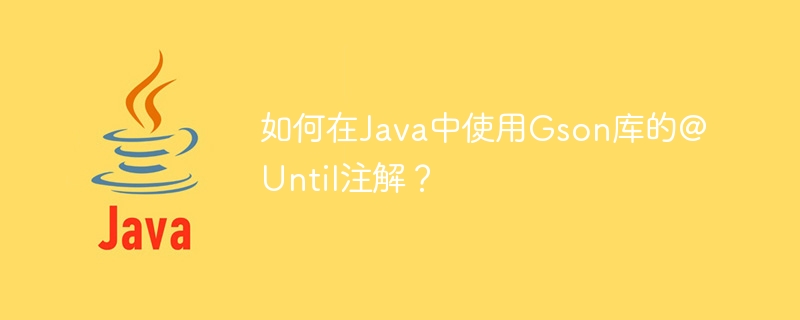How to use the @Until annotation of the Gson library in Java?

@Until Note Can be used with the setVersion() method of the GsonBuilder class. This annotation can be applied to fields in java classes and accepts float as parameter. This parameter represents the version number of the field that has been serialized. @Until Notes Can manage the version control of JSON classes in Network Services.
Syntax
@Documented
@Retention(value=RUNTIME)
@Target(value={FIELD,TYPE})
public @interface UntilExample
import com.google.gson.annotations.Until;
import com.google.gson.Gson;
import com.google.gson.GsonBuilder;
public class GsonUntilAnnotationTest {
public static void main(String[] args) {
Employee emp = new Employee();
emp.setEmployeeName("Adithya");
emp.setEmployeeId(115);
emp.setEmployeeTechnology("Python");
emp.setEmploeeAddress("Pune");
System.out.println("Using version 0.5");
GsonBuilder gsonBuilder = new GsonBuilder();
Gson gson = gsonBuilder.setPrettyPrinting().setVersion(0.5).create();
String jsonString = gson.toJson(emp);
System.out.println(jsonString);
System.out.println("Using version 1.0");
gsonBuilder = new GsonBuilder();
gson = gsonBuilder.setPrettyPrinting().setVersion(1.0).create();
jsonString = gson.toJson(emp);
System.out.println(jsonString);
System.out.println("Using version 1.1");
gsonBuilder = new GsonBuilder();
gson = gsonBuilder.setPrettyPrinting().setVersion(1.1).create();
jsonString = gson.toJson(emp);
System.out.println(jsonString);
}
}
// Employee class
class Employee {
private String empName;
private int empId;
<strong> </strong>@Until(1.1)
private String empTech;
@Until(1.1<strong>)</strong>
private String empAddress;
public String getEmployeeName() {
return empName;
}
public void setEmployeeName(String empName) {
this.empName = empName;
}
public int getEmployeeId() {
return empId;
}
public void setEmployeeId(int empId) {
this.empId = empId;
}
public String getEmployeeTechnology() {
return empTech;
}
public void setEmployeeTechnology(String empTech) {
this.empTech = empTech;
}
public String getEmploeeAddress() {
return empAddress;
}
public void setEmploeeAddress(String empAddress) {
this.empAddress = empAddress;
}
}Output
Using version 0.5
{
"empName": "Adithya",
"empId": 115,
"empTech": "Python",
"empAddress": "Pune"
}
Using version 1.0
{
"empName": "Adithya",
"empId": 115,
"empTech": "Python",
"empAddress": "Pune"
}
Using version 1.1<strong>
</strong>{
"empName": "Adithya",
"empId": 115
}The above is the detailed content of How to use the @Until annotation of the Gson library in Java?. For more information, please follow other related articles on the PHP Chinese website!

Hot AI Tools

Undresser.AI Undress
AI-powered app for creating realistic nude photos

AI Clothes Remover
Online AI tool for removing clothes from photos.

Undress AI Tool
Undress images for free

Clothoff.io
AI clothes remover

AI Hentai Generator
Generate AI Hentai for free.

Hot Article

Hot Tools

Notepad++7.3.1
Easy-to-use and free code editor

SublimeText3 Chinese version
Chinese version, very easy to use

Zend Studio 13.0.1
Powerful PHP integrated development environment

Dreamweaver CS6
Visual web development tools

SublimeText3 Mac version
God-level code editing software (SublimeText3)

Hot Topics
 Square Root in Java
Aug 30, 2024 pm 04:26 PM
Square Root in Java
Aug 30, 2024 pm 04:26 PM
Guide to Square Root in Java. Here we discuss how Square Root works in Java with example and its code implementation respectively.
 Perfect Number in Java
Aug 30, 2024 pm 04:28 PM
Perfect Number in Java
Aug 30, 2024 pm 04:28 PM
Guide to Perfect Number in Java. Here we discuss the Definition, How to check Perfect number in Java?, examples with code implementation.
 Random Number Generator in Java
Aug 30, 2024 pm 04:27 PM
Random Number Generator in Java
Aug 30, 2024 pm 04:27 PM
Guide to Random Number Generator in Java. Here we discuss Functions in Java with examples and two different Generators with ther examples.
 Weka in Java
Aug 30, 2024 pm 04:28 PM
Weka in Java
Aug 30, 2024 pm 04:28 PM
Guide to Weka in Java. Here we discuss the Introduction, how to use weka java, the type of platform, and advantages with examples.
 Armstrong Number in Java
Aug 30, 2024 pm 04:26 PM
Armstrong Number in Java
Aug 30, 2024 pm 04:26 PM
Guide to the Armstrong Number in Java. Here we discuss an introduction to Armstrong's number in java along with some of the code.
 Smith Number in Java
Aug 30, 2024 pm 04:28 PM
Smith Number in Java
Aug 30, 2024 pm 04:28 PM
Guide to Smith Number in Java. Here we discuss the Definition, How to check smith number in Java? example with code implementation.
 Java Spring Interview Questions
Aug 30, 2024 pm 04:29 PM
Java Spring Interview Questions
Aug 30, 2024 pm 04:29 PM
In this article, we have kept the most asked Java Spring Interview Questions with their detailed answers. So that you can crack the interview.
 Break or return from Java 8 stream forEach?
Feb 07, 2025 pm 12:09 PM
Break or return from Java 8 stream forEach?
Feb 07, 2025 pm 12:09 PM
Java 8 introduces the Stream API, providing a powerful and expressive way to process data collections. However, a common question when using Stream is: How to break or return from a forEach operation? Traditional loops allow for early interruption or return, but Stream's forEach method does not directly support this method. This article will explain the reasons and explore alternative methods for implementing premature termination in Stream processing systems. Further reading: Java Stream API improvements Understand Stream forEach The forEach method is a terminal operation that performs one operation on each element in the Stream. Its design intention is






